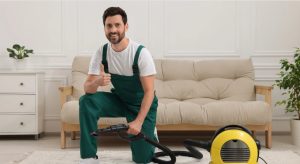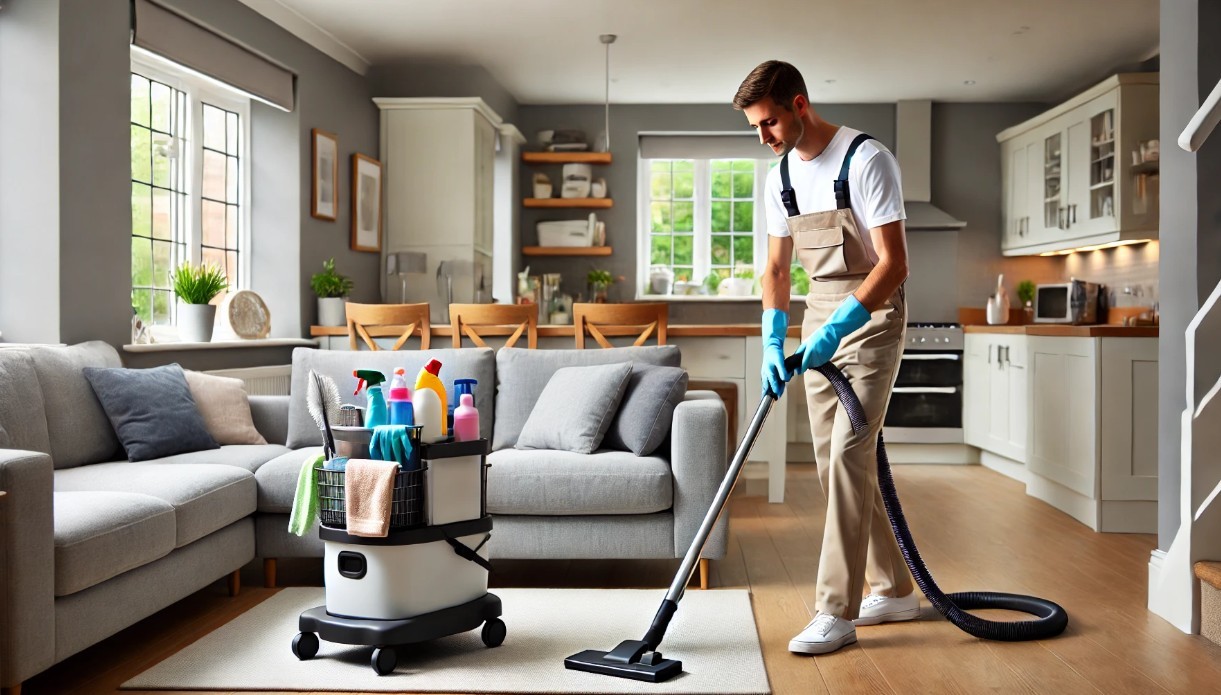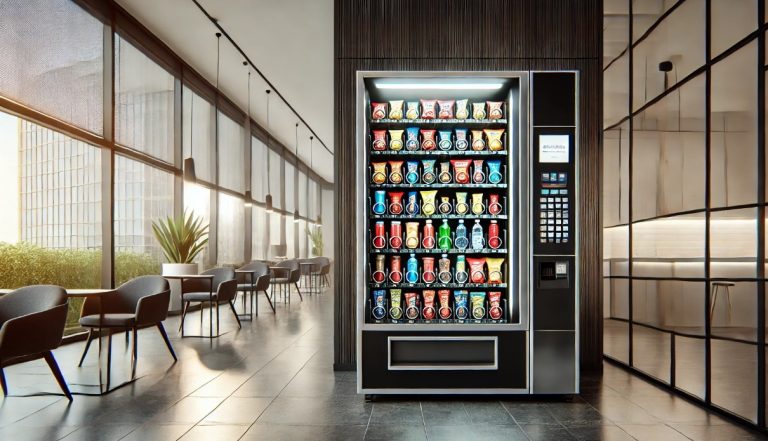Self-Employed Cleaner Hourly Rate UK: How Much Do House Cleaners Earn?
The cleaning industry in the UK is thriving, with more individuals opting to work as self-employed cleaners due to the flexibility and earning potential it offers.
Whether providing domestic, commercial, or specialist cleaning services, self-employed cleaners can set their own rates, choose their clients, and work on their own terms.
However, one of the biggest challenges for independent cleaners is deciding how much to charge per hour. The self-employed cleaner hourly rate in the UK depends on various factors such as location, experience, and the type of service provided.
While some cleaners earn as little as £12 per hour, others in high-demand areas like London and Edinburgh can charge up to £30 or more.
This guide provides a comprehensive look at the hourly rates for self-employed cleaners in the UK, the factors affecting earnings, and how cleaners can maximise their income while running a profitable business.
What Is the Average Self-Employed Cleaner Hourly Rate in the UK?

The hourly rate for self-employed cleaners in the UK varies depending on factors such as location, experience, and the type of cleaning service offered.
On average, self-employed cleaners charge between £12 and £25 per hour, with specialist cleaning services commanding even higher rates. One of the most significant factors influencing a cleaner’s earnings is geographic location.
Cleaners working in major cities and high-demand areas tend to charge more due to the increased cost of living and greater demand for professional cleaning services.
Hourly and Daily Rates Across the UK
Below is a breakdown of self-employed cleaner hourly and daily rates across different cities in the UK. These figures exclude VAT or additional call-out charges.
| Location | Hourly Rate (£) | Daily Rate (£) |
| London | 19 | 154 |
| Birmingham | 16 | 143 |
| Leeds | 19 | 118 |
| Glasgow | 17 | 136 |
| Sheffield | 15 | 108 |
| Bradford | 19 | 118 |
| Liverpool | 15 | 123 |
| Edinburgh | 27 | 193 |
| Manchester | 19 | 138 |
| Bristol | 18 | 153 |
| Kirklees | 20 | 129 |
| Fife | 32 | 199 |
| Wirral | 15 | 120 |
| North Lanarkshire | 18 | 139 |
| Wakefield | 19 | 116 |
| Cardiff | 21 | 161 |
| Dudley | 16 | 143 |
| Wigan | 17 | 132 |
| East Riding | 22 | 145 |
| South Lanarkshire | 19 | 148 |
| Coventry | 18 | 172 |
| Belfast | 15 | 109 |
| Leicester | 25 | 168 |
| Sunderland | 15 | 118 |
| Nottingham | 21 | 143 |
| Newcastle Upon Tyne | 16 | 118 |
| Kingston-upon-Hull | 21 | 140 |
| Bolton | 18 | 135 |
| Walsall | 16 | 143 |
| Plymouth | 15 | 108 |
| Stoke-on-Trent | 18 | 124 |
| Wolverhampton | 16 | 141 |
| Rhondda, Cynon, Taff | 22 | 160 |
| Derby | 21 | 143 |
| Swansea | 17 | 125 |
| Milton Keynes | 21 | 159 |
| Portsmouth | 21 | 160 |
| Luton | 20 | 160 |
| Chelmsford | 20 | 153 |
| Brighton | 23 | 160 |
| Peterborough | 18 | 204 |
| Southend-on-Sea | 20 | 149 |
| Norwich | 20 | 143 |
| Isle of Wight | 21 | 159 |
| Cambridge | 30 | 198 |
| Exeter | 15 | 108 |
| Dover | 18 | 130 |
| Cheltenham | 28 | 212 |
| Dundee | 42 | 267 |
Trends in Cleaner Hourly Rates Across the UK
- London and Edinburgh have some of the highest cleaning rates, reflecting the higher cost of living and greater demand for domestic services.
- Smaller cities and rural areas have lower rates, often ranging from £12 to £18 per hour, as the cost of living is lower and competition among cleaners is higher.
- Specialist cleaning services, such as deep cleaning, post-construction cleaning, and eco-friendly cleaning, allow self-employed cleaners to charge premium rates, sometimes up to £35 per hour.
- Cleaners offering commercial cleaning tend to have a higher daily rate, as businesses often require longer cleaning sessions and additional tasks beyond standard domestic cleaning.
How Do These Rates Compare to Employed Cleaning Jobs?
Self-employed cleaners generally earn more per hour than those employed by cleaning agencies. While agency-employed cleaners often earn £10–£12 per hour, self-employed professionals can set their own rates and earn between £15 and £30 per hour, depending on their expertise and client base.
However, self-employed cleaners also bear additional responsibilities, such as purchasing their own cleaning supplies, handling tax obligations, and marketing their services.
This means that while they earn more per hour, their net income depends on how effectively they manage their business costs.
What Factors Affect a Self-Employed Cleaner’s Earnings?

Several key factors determine how much a self-employed cleaner can earn per hour.
1. Location
- The biggest factor affecting hourly rates is location. Cleaners working in London, Manchester, and other major cities can command higher rates due to the increased cost of living and greater demand for cleaning services.
- In contrast, cleaners in rural areas or small towns often need to charge lower rates to stay competitive.
2. Experience & Reputation
- A cleaner’s experience and reputation also influence pricing. New cleaners typically start at lower rates to attract their first few clients.
- As they gain experience and build a good reputation, they can gradually increase their rates. Positive client reviews and word-of-mouth recommendations can help a cleaner justify charging premium rates.
3. Type of Cleaning Service
- Different types of cleaning services come with different price points.
- Basic domestic cleaning generally has lower rates, while specialised cleaning services can attract higher fees due to the expertise and equipment required.
| Cleaning Service | Hourly Rate (£) | Details |
| Domestic Cleaning | 12–15 | Routine household tasks like vacuuming, dusting, and mopping. |
| Deep Cleaning | 20–25 | More intensive cleaning, including carpets, ovens, and neglected areas. |
| End-of-Tenancy Cleaning | 25–30 | A full clean to meet landlord or agency requirements. |
| Eco-Friendly Cleaning | 20–30 | Uses non-toxic, sustainable products for environmentally conscious clients. |
| Post-Construction Cleaning | 25–35 | Removing dust, debris, and stains after building work. |
| Commercial Cleaning | 15–25 | Cleaning offices, retail stores, and business premises. |
- Cleaners who specialise in deep cleaning, end-of-tenancy cleaning, or post-construction cleaning tend to earn more as these jobs require more effort and skill.
4. Business Expenses
Unlike employed cleaners who receive cleaning supplies and equipment from their employer, self-employed cleaners need to cover their own expenses. This includes:
- Cleaning products and equipment
- Insurance (public liability insurance is recommended)
- Transportation and fuel costs
- Marketing expenses such as website maintenance or advertising
Cleaners need to factor these costs into their hourly rate to ensure their business remains profitable.
How Much Should a Self-Employed Cleaner Charge Per Hour?

Setting the right hourly rate requires balancing competitive pricing with business profitability. A common formula to calculate an ideal hourly rate is:
(Total Monthly Expenses + Desired Profit) ÷ Workable Hours = Hourly Rate
For example, if a cleaner has:
- Monthly business expenses of £300
- A target profit of £2,000 per month
- 120 workable hours per month
Their hourly rate should be:
(£300 + £2,000) ÷ 120 = £19.17 per hour
However, rates should also reflect market demand and competitor pricing. A cleaner can charge higher rates during peak seasons or for last-minute bookings.
How Do Self-Employed Cleaning Rates Compare to Other Cleaning Jobs?
Self-employed cleaners often earn more per hour than employed cleaners because they set their own rates and work directly with clients.
However, they also bear more responsibility, including handling taxes, purchasing supplies, and marketing their services.
| Cleaning Job | Hourly Rate (£) |
| Domestic Cleaning | 12–15 |
| Commercial Cleaning | 15–25 |
| End-of-Tenancy Cleaning | 25–30 |
| Deep Cleaning | 20–25 |
| Specialist Cleaning (Eco-friendly, Post-construction) | 25–35 |
While self-employed cleaners typically earn £12 to £25 per hour, those offering specialist services can charge up to £35 per hour or more.
What Are the Legal & Financial Considerations for Self-Employed Cleaners?

Being a self-employed cleaner in the UK offers independence and flexibility, but it also comes with several legal and financial responsibilities.
Unlike employed cleaners who have their tax and insurance managed by an employer, self-employed cleaners must handle these aspects themselves.
Understanding the legal and financial obligations is crucial to running a sustainable and profitable business.
Registering as Self-Employed
Self-employed cleaners must register with HMRC as a sole trader or limited company. This ensures that they comply with tax regulations and avoid penalties.
Registering as a sole trader is the most straightforward option for those working alone, while forming a limited company may be beneficial for cleaners looking to expand and hire employees.
The registration process includes:
- Declaring self-employment within three months of starting the business.
- Submitting a Self-Assessment tax return annually.
- Keeping records of income, expenses, and invoices for tax filing.
Tax Obligations
Self-employed cleaners are responsible for calculating and paying their own taxes. This includes:
- Income Tax: Charged on annual earnings after deducting expenses.
- National Insurance Contributions (NICs): Self-employed individuals pay Class 2 and Class 4 NICs, which contribute towards state benefits and pensions.
- Value Added Tax (VAT): If annual earnings exceed £90,000, cleaners must register for VAT and charge clients accordingly.
To avoid surprises, it’s advisable to set aside 20-30% of income for tax payments. Using accounting software like QuickBooks or FreeAgent can help manage tax calculations efficiently.
Insurance Requirements
Self-employed cleaners should consider getting public liability insurance, which protects them in case of accidents, property damage, or client claims. Some agencies and businesses require proof of insurance before hiring a cleaner.
Other recommended insurances include:
- Employer’s Liability Insurance (if hiring staff).
- Personal Accident Insurance (to cover loss of income due to injury).
- Equipment Insurance (to protect valuable cleaning tools).
Managing Business Expenses
To ensure profitability, self-employed cleaners should track and manage their expenses carefully. Common business costs include:
- Cleaning products and equipment (vacuum cleaners, eco-friendly solutions).
- Transportation (fuel, public transport fares).
- Marketing (website, business cards, online ads).
Maintaining separate business and personal accounts makes financial tracking easier and ensures that expenses are deductible when filing taxes.
How Can Self-Employed Cleaners Maximise Their Earnings?

Self-employed cleaners can significantly increase their income by adopting smart pricing strategies, offering premium services, and improving efficiency.
Since they are responsible for managing their own business, diversifying services and building a strong client base are key to financial success.
Offering Specialised & High-Value Services
While standard domestic cleaning typically pays £12-£15 per hour, specialised services can command much higher rates. Cleaners can offer:
- Deep Cleaning (£20-£25 per hour): Includes intensive scrubbing, carpet shampooing, and oven cleaning.
- End-of-Tenancy Cleaning (£25-£30 per hour): A full property clean for tenants moving out.
- Eco-Friendly Cleaning (£20-£30 per hour): Uses sustainable, non-toxic products for environmentally conscious clients.
- Post-Construction Cleaning (£25-£35 per hour): Removing dust, debris, and stains from building sites.
Clients are often willing to pay more for these services, especially if they require specialised equipment or extra effort.
Charging Premium Rates for Urgent & One-Off Bookings
Cleaners can increase their rates for last-minute requests, weekend work, and holiday bookings. Some clients need immediate cleaning services due to unexpected guests or urgent move-outs, and they are willing to pay a premium rate for quick service.
Building a Strong & Loyal Client Base
A steady flow of clients ensures a stable income. Self-employed cleaners can:
- Offer discounts for regular clients who book weekly or monthly services.
- Encourage referrals by giving incentives to existing clients for recommending new customers.
- Use online platforms like Bark, TaskRabbit, and social media to attract new clients.
Marketing & Branding for Better Visibility
Many self-employed cleaners rely on word-of-mouth recommendations, but digital marketing can significantly expand their reach.
Creating a Google My Business profile, advertising on Facebook, and maintaining a professional website with client testimonials can make a cleaner stand out in a competitive market.
Maximising Work Efficiency
Time is money in the cleaning industry. Self-employed cleaners can increase productivity by:
- Investing in high-quality, time-saving equipment (e.g., industrial vacuum cleaners).
- Planning efficient cleaning routes to reduce travel time between clients.
- Using booking and scheduling apps to organise appointments and minimise downtime.
Expanding Services for Extra Income
Cleaners can offer additional services beyond general cleaning to earn more per job. Some of the most in-demand extras include:
| Service | Estimated Cost (£) |
| Window Cleaning (10 windows) | 25 – 50 |
| Carpet Cleaning (per room) | 25 |
| Driveway Cleaning | 250 |
| Kitchen Cleaning (inc. oven) | 100 |
| End of Tenancy Cleaning (3-bed house) | 300 |
By providing multiple services, cleaners can increase their earnings per booking, making each job more profitable.
Offering Subscription-Based Cleaning Packages
Some clients prefer long-term contracts rather than one-off cleaning services. Cleaners can introduce subscription plans with discounts for clients who commit to regular cleanings. For example:
- Fortnightly cleaning for a 2-bed house – £55
- Monthly cleaning for a 2-bed house – £80
This ensures a predictable income while providing clients with a convenient, scheduled service.
Conclusion
Setting the right self-employed cleaner hourly rate in the UK is essential for financial success and business sustainability. The rates vary depending on factors such as location, experience, service type, and demand, with cleaners in cities like London and Edinburgh earning higher rates compared to those in smaller towns.
Self-employed cleaners have the advantage of setting their own prices, but they also need to consider tax obligations, business expenses, and marketing strategies to maximise their earnings.
Offering specialised services, such as deep cleaning, post-construction cleaning, and eco-friendly cleaning, can help increase hourly rates and attract higher-paying clients.
By managing business expenses, building a strong client base, and staying competitive in pricing, self-employed cleaners can run a profitable and thriving business in the UK cleaning industry.
Frequently Asked Questions (FAQs)
What is the average hourly rate for a self-employed cleaner in the UK?
The average hourly rate ranges from £12 to £25 per hour, depending on location, experience, and the type of cleaning service provided.
Which cities offer the highest rates for self-employed cleaners?
London, Edinburgh, and Cambridge have some of the highest cleaning rates, with self-employed cleaners earning £19–£30 per hour.
How can a self-employed cleaner increase their earnings?
Offering specialised services, charging premium rates for urgent bookings, and marketing their business effectively can help cleaners maximise their income.
What expenses should self-employed cleaners consider?
Business expenses include cleaning supplies, equipment, transportation, insurance, and marketing costs, which should be factored into pricing.
Do self-employed cleaners need to pay taxes?
Yes, self-employed cleaners must register with HMRC, file a Self-Assessment tax return, and pay income tax and National Insurance contributions.
What type of cleaning services pay the most?
End-of-tenancy cleaning, post-construction cleaning, and deep cleaning tend to pay the highest rates, ranging from £20 to £35 per hour.
How do self-employed cleaners attract more clients?
Cleaners can attract clients by advertising on social media, using online platforms like Bark, offering referral discounts, and maintaining excellent customer reviews.







